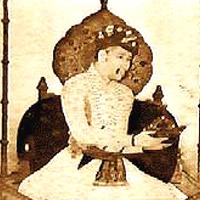In the 16th century, during the reign of Akbar, Islam faced overwhelming threats. The Infallibility Decree in 1579 and Din-i-Ilahi in 1581 were considered to be grave threats to the religion. The Din-i-Ilahi, as propounded by Akbar, was a mixture of various religions. The new religion combined mysticism, philosophy and nature worship. It recognized no gods or prophets and the emperor was its chief exponent. To believe in revelation was considered as “taqlid” (following authority blindly) or a low kind of morality, fit only for the uneducated and the illiterate. Akbar’s Din-i-Ilahi had literally made the orthodox Muslims outcasts in the affairs of the state. Akbar was actually influenced by the Bhakti Movement that had started during the Sultanate period. This philosophy propounded Hindu-Muslim unity. Many sufis, including Qazi Mulla Muhammad of Jaunpur and Qazi Mir Yaqoob of Bengal, condemned his religious innovations. However, the man who took it upon himself to revive Islam was Sheikh Ahmad of Sarhind, commonly known as Mujaddid Alf Sani, or “the reformer of the second millennium”. Sheikh Ahmad was born in Sarhind on June 26, 1564. He joined the Naqshbandiya Silsilah under the discipleship of Khawaja Baqi Billah. He dedicated his sincerity of purpose to purify Islam and to rid it of the accretions of Hindu Pantheism as well as the philosophy of Wahdat-ul Wujud. He gave the philosophy of Wahdat-ush-Shuhud. Mujaddid Alf Sani wrote Ittiba-al-Nubuwwah. In this pamphlet, he quoted Imam Ghazali justifying the need for prophet-hood and explaining the inadequacies of human intellect. Through verbal preaching, discussions and his maktubat (letters) addressed to important nobles and leaders of religious thought, he spread his message amongst the elite in particular. He boldly opposed all plans to bring Islam and Hinduism together on the religious level, knowing that it would loosen the Muslim grip on the sources of imperial strength. Because of these letters, and general atmosphere in the country, he contributed to the swing from Akbar’s heterodoxy to Aurangzeb’s vigorous orthodoxy instead of a return to Babur and Humayun’s policy of laissez faire. Iqbal rightly regarded him as the “Spiritual Guardian of the Muslims” of the Sub-continent and one whom God had alerted to the great perils inherent in the syncretism of Akbar.
This article was last updated on Sunday, June 01, 2003






